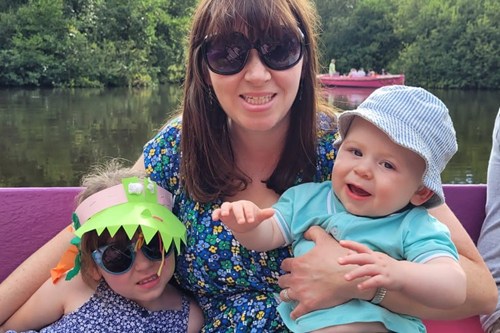Easter travel tips
Published Date: 23 Mar 2023
It’s been a long winter, hasn’t it? The never-ending germs week on week. Taking out a second mortgage to justify putting the heating on. Wearing every item of clothing I own at once in a bid to stay warm. Remember that week it was -7°C? What I mean to say is, I’m looking forward to some sunshine!
In a bid for warmer weather, we’re heading abroad this Easter. This will encompass the usual chaos of packing for two small people (we need a lorry for the amount we take), but it also involves a bit of extra planning as we have two deaf children with different hearing devices. Here are a few tips for travelling that we have come across:
- Spare kit! First and foremost, organise your equipment. For hearing aids this will mean batteries, spare tubing, spare dry bricks – assume something will be thrown in the pool or your toddler will try to destroy it, because holidays are fun like that! For cochlear implants we have a whole host of spare parts. I have a dedicated travel box so I know everything is easy to hand.
- Retention (locks, cords and clips that help hearing devices stay in place). Consider what activities you’ll be doing – surfing, rollercoasters, cycling, horse riding. Even if your child doesn’t use retention devices at home or they think it’s super uncool, it beats going home with one less device because a shark ate it!
- Swimming. Remember the aqua kit if you use it. If you haven’t used it before, practise putting it together at home first as it can be tricky the first few times. Make sure you have retention for the aqua kit too. We use a clothing clip and a swim cap. If your child doesn’t have hearing options in the water, and depending on their age, familiarise them with the pool, the layout, and where your base is. You may even want to make the lifeguard aware there’s a deaf swimmer.
- Airports. Our main advice is to keep all equipment in your hand luggage. We have yet to experience lost luggage with our two, but hearing equipment is the very last thing you want to lose. Remember your cochlear implant ID card for proof of implants, especially if language is a barrier. Some people prefer to avoid going through the security scanners with their processors and will ask to be patted down instead. Lastly, consider looking into priority boarding. This will allow your child to board early when it’s quieter so they can take in their surroundings. It can be overwhelming once the plane is full and the engines start running.
- SOS. Take the time to research before you go and find the nearest audiology department or implant centre. One time when I was 21 and working as a camp counsellor in Vermont, my own mum came to the rescue on the phone when my hearing aid needed a new part. She found a hospital, rang ahead and they were ready to solve my woes on arrival. (Thanks Mum!)
Once you’ve exhausted that list… you’ll need to have a drink, open some Lindor and maybe find the passports because you leave in three hours! Happy travels!
